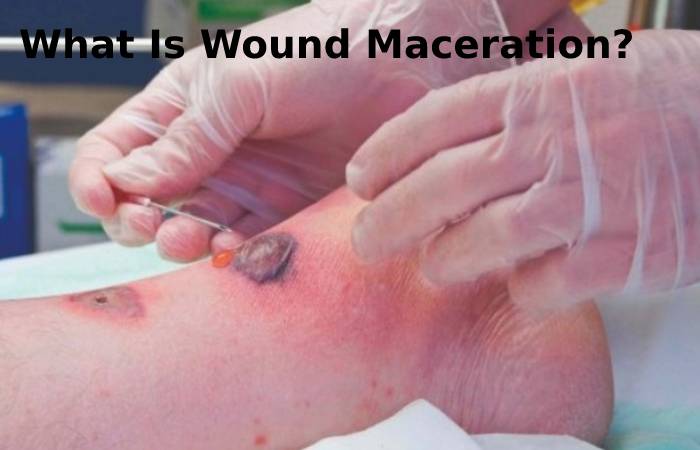Table of Contents
Definition
Maceration Skin – Maceration is defined as the softening and breakdown of the skin as a result of prolonged exposure to moisture. Maceration is caused by liquid remaining in contact with the skin or surface of a wound for extending periods. It often occurs when an occlusive dressing is applying from a paper cut on the finger to much larger injuries that require professional treatment. Maceration also occurs during wound treatment as the skin under the dressing becomes moist from sweat, urine, or other body fluids. Excess moisture is, at times, called hyper hydration.
Wrinkles are the chief sign that the skin is too hydrated. Furthermore, the maceration skin becomes incredibly soft and has a whitish appearance. However, this white skin should not be disordered with a healing wound’s pale, whitish appearance of new epithelial tissue.
Effects of Maceration Skin
- Maceration often occurs when an occlusive dressing is applying from a paper cut on the finger to much larger wounds that require professional treatment. Maceration can also arise after wearing non-breathable latex or plastic gloves, which trap moisture against the skin.
- Maceration also occurs during wound treatment as the skin under the dressing becomes moist from sweat, urine, or other body fluids. Excess moisture is sometimes will be call hyperhydration.
- Wrinkles are the first symbol that the skin is too hydrated. Furthermore, the macerated skin becomes incredibly soft and has a whitish entrance. However, this white skin should not be disordering with a healing wound’s pale, whitish appearance of new epithelial tissue.
- Although most macerations clear up quickly once the skin is exposes to fresh air and allowing to dry, sometimes skin that experiences long periods of maceration is vulnerable to fungal and bacterial infection. In addition, as opportunistic organisms affect the area, it may itch or develop a foul odor.
What Is Wound Maceration?
Prolonged exposure to moisture can affect the skin to soften and break down. This condition, Will call maceration, can be especially problematic for wound healing. Maceration of a wound occurs when the surrounding skin retains too much moisture, causing it to soften and turn white.
Causes
Any prolonged exposure to moisture can cause skin maceration. Smoke can come from the wound, excessive sweating, urinary incontinence, or various external sources.
complications
Wound maceration can increase the risk of infection and prolong healing.
Treatments
The best way to prevent wound maceration is to keep the wound as clean and dry as possible by doing frequent dressing changes with absorbent pads. Use dressings that don’t stick to the damage. Apply suitable antibacterial creams and ointments to fight the infection.
Home Remedies Of Maceration Skin
Take note of how to make a marinade with this simple recipe! We show you how to make a beneficial preparation to use later as an ingredient in your handmade cosmetics. With plants and vegetable oils, you can easily make them at home.
Take note of how to make a marinade with this simple recipe! We show you how to make a beneficial preparation to use later as an ingredient in your handmade cosmetics. With plants and vegetable oils, you can easily make them at home.
To make a macerate, only two ingredients are needed: a dry out plant and vegetable oil. In the Gran Velada online store, you will find Everything you need to make your macerates. In addition, there is a complete herbalist and a comprehensive catalog of vegetable oils at your disposal.
Process Of Making Homemade Macerate
The first thing to preparing a homemade macerate is to choose the ingredients. We recommend that for this type of elaboration, you opt for dry plants, such as rosemary, lavender, calendula, hypericum, Centella Asiatica, and arnica. Then, of course, Everything will rest on the properties you want your macerate to have.
In the Gran Velada online store, you will find a complete herbal shop with dry plants ideal for this preparation. Please get to know its properties and choose the plant that best suits your needs
With vegetable oil, practically the same thing happens: you can choose the one you like best. Our recommendation is always olive oil due to its many properties, but you can opt for borage oil, almond oil, soybean oil, or wheat germ oil … You decide! It is one of the significant advantages of making a homemade macerate.
How To Make A Macerate Step By Step
Here we show you how to make a macerate step by step :
- Fill the glass container with the chosen plant. The greater the quantity of plant, the more concentrates the macerate will be.
- Add the vegetable oil up to the edge of the jar. Again, the plant must be fully cover.
- Stir with a spoon to check that it does not contain air bubbles. Close hermetically.
- Let macerate between 30 or 40 days at room temperature without direct sunlight.
- Strain the macerate and repackage it to preserve it. It is now ready to use.
- The macerate obtain can be use as an ingredient in natural cosmetics to make creams, massage oils, and soaps. On the blog Make Creams, you will find recipes that show how to use this type of elaboration.
- To preserve up to date with all the news and publications, you can follow us on social networks: Facebook, Instagram, Twitter, and Pinterest, and subscribe to our YouTube channel.
Conclusions
Most macerations clear up quickly once the skin is exposes to fresh air and allowing to dry. However, skin that experiences long periods of maceration is sometimes vulnerable to fungal and bacterial infection. In addition, as opportunistic organisms affect the area, it may itch or develop a foul odor. Maceration can also occur after wearing non-breathable latex or plastic gloves, which trap moisture against the skin.
Also Read How To Reduce Chest Fat – Causes Of Decreasing, Exercises, Foods Reduce Breast Size And More.

